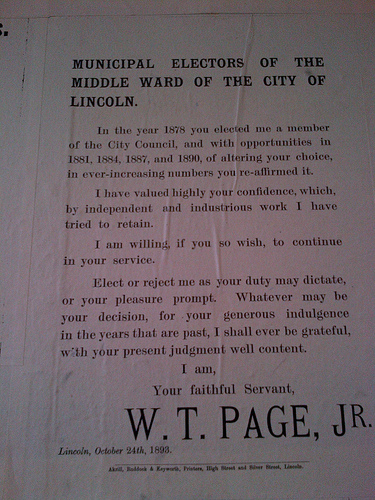Not all is quite so new in the world of political messaging and behaviour change
On my way to windmill spotting in Lincoln a few years back, I happened across this example of an 19th century election leaflet for the City of Lincoln’s local elections.
The leaflet and its typography made by old, but the concepts behind it haven’t dated:

It’s a neat example of a point I’ve made before, that what can seem new and exciting in the world of communications often is really long-established ideas in slightly new clothes. In this case, note two particular features of the message.
First, the reference to electors having previously elected Mr Page four times before. In other words, ‘lots of people liked me, so stick with me’ – a mix of what now in the world of behavioural economics gets dressed up with phrases such as uses of social proof (‘lots of other people like me so you should too’) and appeals to consistency (‘you voted for me before so you should vote for me again’).
Second, Mr Page’s thanks the electors. That’s what now gets called an appeal to reciprocity: I do something nice for you, you’re more likely to do something nice for me.
Certainly, some of the advances in behavioural economics, both in terms of research into how the brain works and in creating theories to marshal and organise such knowledge, are very useful. However, as Lincoln’s Mr Page also shows, they’re not quite as new as some of their keenest proponents make out.
For more about how to make use of such concepts in campaigning, see 101 Ways To Win An Election.
On the other hand, I remember seeing a reproduction of a Liberal leaflet somewhere in Bedfordshire after the Liberal MP had defected to the Liberal Unionists. It had the punchy message “VOTE FOR JUDAS”.